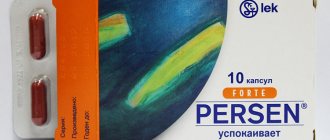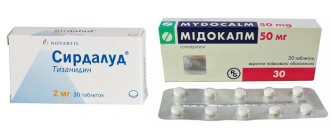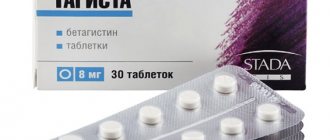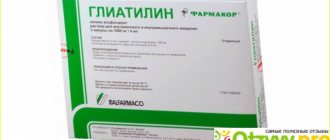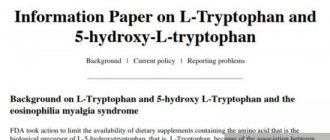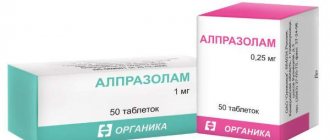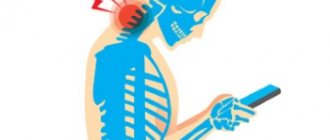AKINETON: SIDE EFFECTS
From the side of the central nervous system: dizziness, drowsiness, weakness, increased fatigue, anxiety, confusion, euphoria, memory impairment and, in some cases, hallucinations, delirious disorders;
nervousness, headache, insomnia, dyskinesia, ataxia, muscle cramps and speech impairment. With increased stimulation of the nervous system, especially in patients with impaired cerebral function, it is necessary to reduce the dose of the drug. On the part of the organ of vision: paresis of accommodation, mydriasis accompanied by photophobia, closed-angle glaucoma (intraocular pressure should be regularly monitored).
Other: decreased sweating, allergic reactions, drug dependence.
Instructions for use
pharmachologic effect
An antiparkinsonian drug that has a central anticholinergic effect, reduces the activity of cholinergic neurons of the striatum (a structural component of the extrapyramidal system). It has moderate peripheral m-anticholinergic (spasmolytic) and ganglion-blocking activity. Eliminates tremor caused by cholinergic drugs (pilocarpine), as well as catalepsy and muscle rigidity due to antipsychotics. Causes psychomotor agitation.
Indications
Parkinson's disease, parkinsonism syndrome, extrapyramidal disorders due to antipsychotic drugs (neuroleptics).
Contraindications
Hypersensitivity, angle-closure glaucoma, megacolon, intestinal obstruction, prostatic hyperplasia. With caution. Pregnancy, lactation, epilepsy, arrhythmias, old age.
Side effects
Dry mouth, mydriasis, accommodation paresis, dyspepsia, constipation, tachycardia, decreased blood pressure, increased fatigue, weakness, dizziness, drowsiness, anxiety, catalepsy, confusion, memory impairment, hallucinations, drug dependence, urinary retention, allergic reactions (skin rash ).
Application and dosage
Inside, intravenously or intramuscularly. The dosage and frequency of administration depend on the indications and age of the patient. For Parkinson's disease - orally, 2 mg 2-4 times a day with a gradual increase in dose to 6-16 mg. For extrapyramidal disorders caused by taking antipsychotic drugs (neuroleptics), a single dose of 2 mg IM or IV; repeated administration of the same dose is possible every 30 minutes (no more than 4 times a day); orally, 2 mg 1-3 times a day.
special instructions
Can be used in children.
Prescription during pregnancy and lactation is possible if the benefit to the mother outweighs the possible risk to the fetus.
A gradual cessation of treatment is necessary (risk of withdrawal symptoms).
During the treatment period, it is necessary to refrain from driving vehicles and engaging in other potentially dangerous activities that require increased concentration and speed of psychomotor reactions (danger of developing dizziness).
Interaction
Strengthens the effect of m-anticholinergics, antihistamines, antiparkinsonian and antiepileptic drugs, weakens the effect of metoclopramide.
Incompatible with ethanol.
Levodopa increases the m-anticholinergic effect, quinidine increases the risk of developing dyskinesias.
Features of application
Akineton tablets must be taken strictly according to the instructions and after prior consultation with your doctor. Initially, the drug must be taken in a minimum dosage, which should gradually increase. In this case, it is necessary to take into account the therapeutic effect and side effects.
Adult patients should take 1 milligram 2-3 times a day. The dosage can be increased daily by 2 milligrams. The daily maintenance dosage should be from 3 to 16 milligrams. The patient is recommended to take no more than 16 milligrams per day. The total dosage is evenly distributed over several doses. Akineton tablets should be taken with or after meals.
Akineton and analogues can be used for parkinsonism syndrome. In this case, it is recommended to use the injection form of the drug. Administration can be intramuscular or intravenous and should be done as slowly as possible. The daily dose is 10-20 milligrams. It must be divided into 2-4 injections.
If a patient experiences movement disorders while taking certain medications, then intramuscular or intravenous administration in a dosage of 2.5-5 milligrams is recommended for adult patients.
If the need arises, re-administration is carried out after half an hour. Patients are recommended to take no more than 20 milligrams of medication per day.
Akineton instructions for use allow it to be used in the form of a solution for the treatment of children under one year of age.
If the baby is less than a year old, it is recommended to administer 0.2 milliliters of the drug, 1-6 years – 0.4 milliliters, over 10 years – 0.6 milliliters. If undesirable effects occur, Akineton and analogues are not recommended to be taken.
This is interesting! What does Depakin Chronosphere help with: instructions for use
If neuroleptic therapy is carried out, then to correct it it is necessary to take from 1 to 4 milligrams. Akineton tablets are recommended to be used 1 to 4 times a day. If the patient's age is from 3 to 15 years, then he is recommended to take the drug 1 to 3 times a day, 1-2 milligrams of medication.
Important!
To reduce unwanted effects, it is recommended to take the tablets after meals.
The course of treatment is determined by the doctor in accordance with the type of disease. Discontinuation of the medication should be carried out by gradually reducing the dosage. In childhood, treatment should be carried out only in short courses.
If a pathology such as nicotine poisoning is observed, then along with other remedies it is recommended to take 5 to 10 milligrams of the drug. If a person’s life is at risk, it is recommended to administer 5 milligrams of the drug intravenously.
While taking the drug, it is necessary to regularly measure intraocular pressure. The action of the active substance can be aimed at reducing the severity of the reaction. That is why it is not recommended to drive vehicles or complex machinery during the course of treatment. If antiparkinsonian, antiepileptic, and antihistamine drugs are taken simultaneously with the drug, peripheral and central side effects may increase.
special instructions
The prescription of biperiden during pregnancy and breastfeeding (lactation) requires strict indications.
Biperiden can enter the baby's body through breast milk, which is the reason for temporary refusal of breastfeeding until about
The description of the drug draws attention to the fact that when deciding whether to prescribe biperiden during pregnancy and lactation, the possible risk to the newborn and fetus is taken into account. The elderly age of the patient becomes a risk factor when treated with this drug
Therefore, Akineton is prescribed to this category of people with great caution.
The elderly age of the patient becomes a risk factor when treated with this drug
Therefore, Akineton is prescribed to this category of people with great caution.
The absence of any data indicating the safety of use in childhood is the reason why the drug Akineton is not used for children.
The description of the drug (instructions for use) indicates the fact that caution is necessary when using this drug in patients with epilepsy or arrhythmia. With prolonged use, drug dependence may develop
With prolonged use, drug dependence may develop.
The risk of developing withdrawal syndrome involves gradual cessation of Akineton therapy.
During therapy, you should avoid drinking alcohol-containing drinks.
Therapy with this drug involves the need to refrain from driving vehicles and engaging in activities that require increased concentration and rapid psychomotor reactions, as this carries a potential danger due to the risk of dizziness.
Contraindications
The drug is contraindicated in:
- Stenosis and obstruction of the gastrointestinal tract;
- Angle-closure glaucoma;
- Megacolon;
- Increased individual sensitivity to any of the components of the drug.
Akineton tablets are not prescribed to children under 3 years of age.
The drug is used with caution during pregnancy, especially in the first trimester. If it is necessary to use Akineton during lactation, it is recommended to stop feeding, since the active substance of the drug is excreted in breast milk.
The drug should be taken with caution in old age, as well as in case of:
- Urinary retention;
- Prostatic hyperplasia;
- Heart rhythm disturbances;
- Predisposition to epileptic seizures.
special instructions
Side effects are observed primarily in the early stages of treatment and when the dose is increased too quickly.
Except in cases of life-threatening complications, abrupt discontinuation of the drug should be avoided.
Elderly patients, especially those with cerebral vascular or degenerative disorders, may often exhibit increased sensitivity to the drug.
Centrally acting anticholinergic drugs like Akineton may increase susceptibility to epileptic seizures
Therefore, doctors should take this fact into account when treating patients with this predisposition.
Tardive dyskinesia caused by antipsychotics may be aggravated by the drug Akineton.
Parkinsonian symptoms in the case of developed tardive dyskinesia in some cases are so severe that they prevent continued treatment with anticholinergic drugs.
Abuse of the drug Akineton has been noted. This phenomenon is possibly related to the mood enhancement and temporary euphoric effects of this drug that are occasionally observed.
During long-term therapy with Akineton, intraocular pressure should be checked regularly.
Impact on the ability to drive vehicles and operate machinery
Taking Akineton, especially in combination with other centrally acting drugs and anticholinergics, may impair the ability to drive a car and operate machinery.
Practical application experience
Reviews from practicing doctors and patients who have taken or are taking Akineton.
I prescribe this drug to my patients without any fear. During my medical practice, side effects were very rare. Since they were minor (nausea), we did not stop taking the drug.
Elena Igorevna, neurologist
I always prescribe Biperidine for Parkinson's disease. Side effects were present, but the therapeutic effect was also visible.
Valentin Sergeevich, neurologist
I take one tablet three times a day daily. I have been doing this for three years now and have had no side effects. Personally, this medication helps me.
Evgeniy, 41
I started taking the medicine with small doses. The effect was immediately noticeable, but when I started increasing the doses, I thought that they would put me in a psychiatric hospital. Everything around me was cloudy, I was slow to think, so I had to interrupt the course of treatment.
Alexandra Valerievna, 56
From the reviews of doctors and patients, we can conclude that the drug has a positive therapeutic effect. But the disadvantages include the presence of a number of side effects.
Drug interactions
The use of Akineton in combination with other anticholinergic psychotropic drugs, antihistamines, antiparkinsonian and antiepileptic drugs may increase central and peripheral side effects.
Concomitant use of quinidine may cause increased anticholinergic cardiovascular effects (especially AV conduction disturbances).
Concomitant administration with levodopa may increase dyskinesia.
Anticholinergics may increase the central side effects of pethidine.
When treated with the drug, the inhibitory effect of ethanol on the central nervous system increases.
Akineton weakens the effect of metoclopramide and similarly acting drugs on the gastrointestinal tract.
Interaction with other drugs
When interacting with antihistamines and anticholinergic drugs, Biperedin only enhances their effect. The same applies to anticonvulsants. Synchronous use with anticholinergic medications enhances the peripheral and central effects of the drug on the body.
Concomitant use with antipsychotics increases the likelihood of tardive dyskinesia.
Concomitant use with Metoclopramide reduces its effectiveness. The active substance of the drug potentiates the effects of ethanol. When taken together with Levodopa, the anticholinergic effect is enhanced and dyskinesia develops.
Side effects and signs of overdose
In some cases, patients may develop various side effects while taking Akineton. Among them:
- digestive problems (nausea, dry mouth, constipation, abdominal pain);
- heart abnormalities (fast or slow heartbeat);
- difficulty urinating, urinary retention;
- decreased sweating;
- allergic reactions on the skin (redness, itching, burning, rash);
- headaches and dizziness;
- visual impairment (deterioration of accommodation, glaucoma, photophobia);
- memory problems;
- confusion;
- euphoric state;
- general weakness, drowsiness, increased fatigue;
- the emergence of anxiety and fear;
- hallucinations;
- sleep problems;
- violation of the coordination of muscle movement;
- convulsive conditions;
- sleep problems;
- disturbance of speech activity.
With frequent use of large doses of the drug, drug dependence may develop. If the patient has taken a very high dose, then he experiences symptoms of overdose:
- dilation of the pupil, lack of its reaction to light;
- redness of the skin (especially on the face);
- increased body temperature;
- tachycardia and arrhythmia;
- lack of intestinal motility;
- stranguria (difficulty urinating);
- excessive excitement;
- delirium, confusion;
- collapse.
If such signs appear, the person should be urgently taken to a medical facility. There he is given an antidote - an acetylcholinesterase inhibitor (physostigmine). Next, symptomatic therapy is prescribed.
Overdose and possible side effects
In case of an overdose of this drug, the following symptoms occur:
- dry mucous membrane;
- dilated pupils;
- skin erythema;
- agitation and confusion;
- overheat;
- violation of intestinal and bladder tone;
- accelerated heartbeat.
In case of an overdose of the drug and individual intolerance to the active component of Akineton, the following side effects also occur:
- CNS : drowsiness and dizziness, anxiety, memory impairment, insomnia, speech alexia. In case of heightened affectivity of the nervous system, the dose of medication should be reduced.
- Cardiovascular system : increased heart rate, bradycardia and decreased blood pressure.
- Urinary system : difficulty urinating, urinary retention (in rare cases).
- Visual system : mydriasis, accommodation, optic nerve palsy, angle-closure glaucoma. In this case, it is necessary to constantly regulate intraocular pressure.
- Digestive system . Dry mouth, nausea, discomfort in the epigastric region, augmentation of the salivary glands, difficult bowel movements.
Article on the topic: Preparation for laparoscopy of an ovarian cyst
It is also possible to experience such side effects as: decreased sweat secretion, allergies, drug regression.
To eliminate all third-party effects, counteracting drugs are prescribed - acetylcholinesterase paralyzers and Physostigmine. If necessary, a catheter is inserted into the bladder. In parallel, pathognomonic treatment is carried out.
Additional Information
According to reviews, Akineton can cause drug dependence.
The appearance of side effects is possible in the initial stages of therapy and with a sharp increase in dosage.
Akineton affects the speed of psychomotor reactions, which must be taken into account by people whose activities involve driving heavy machinery and vehicles.
Discontinuation of the drug must be carried out gradually to prevent deterioration of the patient's condition.
The instructions for Akineton indicate that the medicine should be stored in a dark, cool place out of the reach of children.
The drug is available from pharmacies without a prescription.
Shelf life – 5 years.
General information about the medicine
Akineton is a widely used drug that is prescribed to eliminate the symptoms of parkinsonism and other neurological pathologies. The drug is produced in Italy, but the owner of the registration certificate is the German pharmaceutical company.
Drug group, INN, application
The drug belongs to a special drug group - central anticholinergic blockers. Such drugs are often used for Parkinson's disease, as well as for the relief of various movement disorders. The international nonproprietary name depends on the name of the active component, which is part of the drug and determines its effect on the body. Akineton's INN is Biperiden.
Effect of the drug
The scope of application of the drug is neurology. It can eliminate the negative manifestations of primary or secondary parkinsonism in adults and children.
Release form, cost
The drug is available in two dosage forms, which differ slightly in composition and method of administration. Akineton can be found on pharmacy shelves in the form of:
- Tablets. They are white in color and have a flat cylindrical shape. The tablets are packaged in cell blisters covered with aluminum foil, 10 or 20 pieces each. In total, a cardboard box contains 20, 50 or 100 tablets.
- Solution for injection. It is a clear liquid. The solution is placed in glass ampoules, which are packaged in 5 pieces in cardboard boxes.
Depending on the form of release, the price of the drug is determined. Pharmacies also dictate their pricing policy. The cost of the medication in different pharmacies in Russian cities is presented in the table.
| Name of medicine | Pharmacy, city | Cost in rubles |
| Akineton 2 mg, No. 100 | Neopharmacy, Moscow | 530 |
| Akineton 2 mg, No. 100 | ZdravCity, Arkhangelsk | 549 |
| Akineton 2 mg, No. 100 | Apteka.ru, Rostov-on-Don | 517 |
| Akineton 2 mg, No. 100 | Apteka.ru, Omsk | 545 |
| Akineton ampoules 1 ml, 5 mg, No. 5 | EAPTEKA.RU, Moscow | 736 |
This drug can only be purchased with a special prescription from a doctor. It is included in the list of vital essential medicines. But finding it in pharmacies can be problematic. As a rule, it must be pre-ordered by phone or online.
Composition and pharmacological properties
The medicine contains an active component - biperiden. Its content, as well as the presence of excipients, depends on the form of release:
- One tablet contains 2 mg of biperiden hydrochloride and additionally corn and potato starch, lactose, calcium hydrogen phosphate, talc, magnesium stearate and purified water.
- 1 ml of solution for injection contains 5 mg of biperiden lactate. The excipients included: sodium lactate and water for injection.
Application and contraindications
Pharmacodynamic properties are based on the action of the active component biperiden. This substance is a central anticholinergic blocker that reduces the activity of cholinergic neurons in the central nervous system. At the same time, rigidity and trembling of muscles and limbs decreases. However, biperiden can provoke various autonomic disorders and psychomotor agitation.
Pharmacokinetic features:
- quickly absorbed in the digestive tract;
- the maximum concentration is observed 1-2 hours after administration;
- binds to blood proteins by more than 90%;
- metabolized completely with the release of active metabolites;
- metabolites are excreted through the kidneys and intestines;
- elimination consists of 2 phases: the first half-life occurs one and a half hours after taking the medicine, the second - a day later.
Indications and contraindications for use
Akineton and similar biperiden-based products are prescribed in the following cases:
- Parkinson's disease;
- intoxication with nicotine and phosphorus-containing components;
- parkinsonism syndrome;
- extrapyramidal manifestations in children and adults associated with the use of antipsychotics or similar drugs.
Article on the topic: Why does a child often bleed from the nose?
Contraindications for use:
- the presence of mechanical narrowing of the walls of the gastrointestinal tract;
- enlargement of the prostatic gland;
- presence of tachyarrhythmia;
- allergy to the components of the medication;
- presence of angle-closure glaucoma;
- the presence of pathologies in the digestive tract (reaction, megacolon, stricture);
- intussusception;
- pregnancy and breastfeeding;
- extrasystole;
- epilepsy;
- advanced age;
- children up to three years of age.
Akineton (Biperiden): mechanism of action
Akineton (Biperiden) is a synthetic anticholinergic drug that reversibly binds to muscarinic receptors and suppresses the central conduction of cholinergic stimuli, resulting in the restoration of the balance between the dopaminergic and cholinergic systems. Akineton (Biperiden) has a weak antidepressant and antispasmodic effect on smooth muscles. Inhibits tremor. Restrains extrapyramidal rigidity, alleviates akinesia, reduces autonomic disorders (reduces excessive secretion of saliva, sweat, sebum). After oral administration, the drug begins to be absorbed after approximately 30 minutes; the time to reach maximum concentration is 1.5 hours. In the blood, 95% of the drug binds to plasma proteins. The half-life in patients is 23–36 hours. Akineton (Biperiden) passes into breast milk (the concentration is equal to the concentration in the blood). The effect of the drug lasts for 48 hours after discontinuation of use.
Pharmacological properties
Pharmacodynamics
Akineton is a centrally acting anticholinergic drug that reduces the activity of cholinergic neurons of the striatum (belong to the structural components of the extrapyramidal system). The peripheral anticholinergic effect of biperiden is less pronounced.
Biperiden reduces rigidity and tremor. Leads to psychomotor agitation and autonomic disorders.
Pharmacokinetics
After taking biperiden orally, Cmax (maximum concentration of the substance) is 1.01–6.53 ng/ml, the time to reach it is from 30 to 120 minutes. Css (equilibrium concentration) after oral administration of 2 mg of the drug 2 times a day is achieved in 15.7–40.7 hours. Bioavailability after a single dose is approximately 33 ± 5%.
The binding of biperiden to plasma proteins after oral and parenteral administration ranges from 91 to 94%. Plasma clearance – 11.6 ± 0.8 ml/min/kg.
Biperiden is excreted in breast milk.
The substance is completely metabolized. Its main metabolites are piperidine and bicycloheptane.
Excretion is carried out in feces and urine in the form of metabolites and occurs in two phases. T1/2 (half-life) of the first phase is 1.5 hours, the second is 24 hours.
In elderly patients, the T1/2 value may increase to 38 hours.
Similar means
The drug Akineton has analogues according to the mechanism of action, however, they contain other active components. Most often, drugs based on:
- levodopa and carbidopa (Sindopa pilyule_nervi-237, Nakom, Stalevo);
- piriberyl (Pronoran pilyule_nervi-233);
- amantadine (PC-Merz);
- ropinirope (Requip Modutab pilyule_nervi-234).
There are also substitutes based on a similar active ingredient. Among them are:
- Bezak. This is a domestic structural analogue of Akineton. It costs much less (about 100 rubles per package), but is no less effective.
- Mendylex pilyule_nervi-226. Available in the form of tablets of 2 mg biperiden each. Country of origin: Macedonia. Good and affordable medicine.
Only the attending physician can prescribe this or that drug. It is not recommended to change the prescribed medicine without consulting him.
Release form and composition
Akineton is available in two dosage forms.
Akineton, tablets - almost white, flat-cylindrical, on one side there is a cross-shaped mark, with chamfers. Packaged in blisters of 10 and 20 pieces.
Akineton, a solution for intravenous and intramuscular administration, is a clear, colorless liquid. Packaged in 1 ml clear glass ampoules.
| Akineton, tablets | 1 tab. |
| Biperiden hydrochloride | 2 mg |
| Excipients: corn starch, lactose monohydrate, microcrystalline cellulose, calcium hydrogen phosphate dihydrate, potato starch, copovidone, talc, magnesium stearate, purified water. |
| Akineton, solution for intravenous and intramuscular administration | 1 ml |
| Biperiden lactate | 5 mg |
| Excipients: sodium lactate, water for injection |
